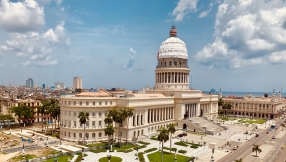UN says Ethiopia Not Blocking Aid
A rebel group in the desolate area bordering Somalia demanded a U.N. investigation after The New York Times quoted Western diplomats and aid officials on Sunday accusing Ethiopian authorities of stopping food aid reaching the Ogaden region.
A WFP spokesman in Nairobi said the government was not "blockading" Ogaden because WFP was distributing food in three of the region's zones, while assessments had started or were about to start in its other three zones.
But it and other donors were concerned, he said.
Restrictions on trade and the movement of aid due to military operations, as well as seasonal floods, rising prices and other factors could cause a humanitarian crisis among some communities, the WFP's Peter Smerdon told Reuters.
"The military operations and restrictions on movement in some areas have affected all humanitarian actors providing assistance ... including other U.N. agencies and NGOs, but we are working with the government to gain access," Smerdon said.
Ethiopian government officials have not been available to comment on the newspaper article or the rebels' claims.
ICRC EJECTED
But the Somali state's regional government, in charge of the Ogaden, ordered the International Committee of the Red Cross to leave the area within seven days, accusing it of collaborating with rebels.
Ogaden is a parched landscape with few roads that is populated largely by nomadic camel herders and is effectively off-limits to most human rights workers and journalists.
Last month, Ethiopian Prime Minister Meles Zenawi announced a crackdown on the Ogaden National Liberation Front (ONLF) guerrillas, who say they are fighting for autonomy for their homeland -- the poorest part of the country.
Addis Ababa says the ONLF is a terrorist group bankrolled by arch-foe Eritrea.
The ICRC's head of delegation to Ethiopia, Jean Pierre Schaerer, confirmed the expulsion orderd but said: "We don't want to comment at the moment as we are still negotiating with the regional government about their decision."
An Ethiopian government spokesman confirmed the group had been ordered to leave for "conniving with the rebel ONLF".
On Tuesday, the ONLF said WFP was distributing food only in parts of Ogaden that were quiet, not in areas where fighting was going on and where most of the local population lives.
"They are twisting the facts," London-based spokesman and ONLF founder-member Abdirahman Mahdi told Reuters by telephone. "To say the government is not blocking aid from reaching the places it is needed is absolutely ridiculous. We refute it."
WFP said military operations that started in May, then intensified in June, had delayed the dispatch of emergency aid.
But it said 2,200 tons of food had now been sent to three Ogaden zones -- Shinile, Afder and Liben -- where WFP monitors on the ground were checking that it reached people in need.
The U.N. relief body OCHA will also lead an inter-agency team to the region on Wednesday, Smerdon said, where it will meet the local authorities and others.
Any further delays would have serious humanitarian implications, WFP says, as the region suffered a major drought and floods last year and has only just started to recover. More floods are likely in August and September.













